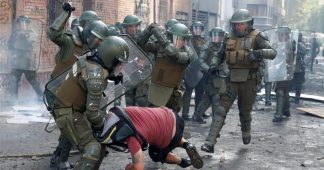Ukrainian lawmakers have voted to remove human rights commissioner Lyudmila Denisova, accusing the official of doing too little to protect citizens amid an ongoing Russian invasion, and of tarnishing Kiev’s reputation abroad with unverified atrocity stories.
The Verkhovna Rada moved to fire Denisova earlier this week, with 234 deputies voting for her ouster, according to local media reports. Her five-year term was set to expire in 2023, but with her early dismissal it’s not yet clear who will fill the position, often described as ‘human rights ombudsman’ in Western press coverage.
Pavlo Frolov – a member of the ruling ‘Servant of the People’ party and deputy chair of a parliamentary ethics committee – outlined a number of complaints against Denisova, arguing that she had spent too much time in “warm Western Europe” since Russia’s invasion commenced earlier this year.
“After February 24, the current Verkhovna Rada commissioner for human rights spent time abroad, but not in Russia or Belarus, where her status and powers could help prisoners, deportees and victims of the occupation,” Frolov said, adding that she had “hardly exercised her authority to organize humanitarian corridors.”
The official went on to note Denisova’s “incomprehensible concentration” on “numerous details of ‘unnatural sexual crimes’ and the ‘rape of children’ in the occupied territories, which could not be confirmed by evidence,” saying those allegations only “harmed Ukraine and distracted the world media from Ukraine’s real needs.”
As commissioner, Denisova repeatedly accused Russian forces of grave human rights abuses, including the rape and sexual abuse of minors as young as 1, claims readily echoed in Anglophone media outlets.
While first-hand testimony and forensic examinations of victims indicate Ukrainian women have endured horrific abuses at the hands of some Russian soldiers, Denisova’s high-profile media work has come under fire from local reporters, human rights activists and lawyers.
In an open letter published late last month, nearly 150 Ukrainian journalists and academics urged the commissioner to be more careful in publicizing war crimes allegations, not only asking her to provide sufficient evidence for such charges, but to avoid sensationalizing grisly details at the expense of victims and their families.
“When publicly communicating sexual crimes during wartime (especially when the victims are children), it is important to take into account not only the ethics of the wording, but also the justification and expediency of publishing certain details that may shock,” the letter said, adding:
“We are concerned that the Ukrainian media will become just a platform for spreading ‘horrific details’ about sexual crimes during the war, instead of serving as voices in support of collecting evidence in relevant criminal cases and fair punishment, and spreading information about where and how to contact survivors of violence.”
Denisova’s dismissal was opposed by ex-President Petro Poroshenko’s European Solidarity party, as well as former Prime Minister Yulia Tymoshenko’s Batkivshchyna (Fatherland) party, though garnered significant support among Servant of the People deputies.
The former commissioner has alleged that President Volodymyr Zelensky personally authorized her firing ahead of the parliamentary vote, though the deputy chief of the president’s office, Andriy Smyrnov, rejected that charge. Some activists, such as Tetyana Pechonchyk of the ZMINA Human Rights Center, argued that Denisova’s dismissal was unconstitutional, while other supporters have noted the rights commissioner role has often been politicized, including in a prior attempt to remove Denisova last fall.
We remind our readers that publication of articles on our site does not mean that we agree with what is written. Our policy is to publish anything which we consider of interest, so as to assist our readers in forming their opinions. Sometimes we even publish articles with which we totally disagree, since we believe it is important for our readers to be informed on as wide a spectrum of views as possible.











